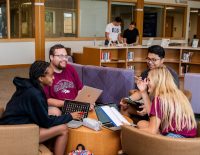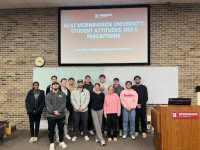 By Kevin Green ~ All full time undergraduate students at Morningside are enrolled in the Notebook Computer Program. But what exactly does that entail? Aside from signing for their computers, many students lack interest in or knowledge of the program and never give it a second thought.
By Kevin Green ~ All full time undergraduate students at Morningside are enrolled in the Notebook Computer Program. But what exactly does that entail? Aside from signing for their computers, many students lack interest in or knowledge of the program and never give it a second thought.
Thankfully Dr. Marlene Jacobson, educational technologist here at Morningside, took a few moments to answer questions regarding the program and offer tips to students.
The Collegian: Nice office. Though the curtains make it look like you’re shutting yourself out from the rest of the world.
Dr. Jacobson: The table out front of my window is very popular because there’s an outlet and people charge their computers. I’m sitting here working and there’s some one’s face right there. Plus there are a lot of classes in the library, so it can be a bit distracting. I don’t want to close the blinds because I know that makes it look like I’m not very friendly, so it’s a happy medium.
The Collegian: Speaking of computers, the Information Services Team here is making plans for next year. Has the school given any thought to tablets or Ipads?
Dr. Jacobson: Yes we have. In fact, we started last year with the big rage of Ipads. We’re investigating what students use them for. They’re very hot. They’re very flashy. Of course we want to do cool stuff but we need to see how the tool fits in with the teaching and learning. Keep in mind Ipads cost around $479, that’s a lot of money. As students you still need to do word-processing, spreadsheets, and have specific software like Adobe Suite for graphic design classes as well as software for other disciplines. Ipads won’t do that.
Next year I’m going to be offering pilot programs that use Android devices. We’re also looking at eReaders and e-Text.
The Collegian: Really?
Dr. Jacobson: We put an eReader on the student issued computers this year. But only have a few faculty who are looking at having eTextbooks. The e-Text allow for interactivity. For example with anatomy or nursing an organ picture could break apart and animate and have interactive activities identifying the parts and/or uses. It’s almost like an imbedded video. At the same time we’re trying to save students money, because textbooks are so expensive.
The Collegian: What about the Dells. It seems like more and more students are steering away from them?
Dr. Jacobson: This is my fourth school year. When I first came we had laptop assignments for students based on their major. Only music and graphic arts got Macs and the rest got PCs. Then we decided to open up the decision to the students. The Macs are more expensive and Apple does great advertising. We try to give informed decisions to students, but I’m convinced there are “Mac-Heads” and “PC-Heads.” The way that people approach computing is in a sense the way they do a lot of things.
The Collegian: Are there any services or tricks that students may not necessarily know about or be utilizing?
Dr. Jacobson: There’s a group of us on the 2015 technology task force. The president has formed the group to look at the future of computing. He’s concerned about economy and making sure we are technologically on top of the game.
There’s a need for students to have more technological skills and savvy. There’s a myth out there that students know how to do everything and it’s the faculty who are behind. I help students but very few take advantage of the service. We’re finding that students don’t know what they probably should and that’s scary. We need to assess what our students know and don’t know.
The Collegian: Any examples?
Dr Jacobson: Plagiarism is a big one. It’s so easy to grab stuff and not know that it’s stealing. Lending files of things someone downloaded and making a copy then keeping it for example. Students think that’s fine. There’s a value system the current generation of students don’t understand. They think it’s free just because you can do it.
Also, It ‘s hard for them to understand what’s safe computing and what’s not. A lot of our students get viruses and we fix them up, but there are ways they can prevent that, though they don’t know how. I’d love to help. All anyone has to do is drop by and ask.






Leave a Reply